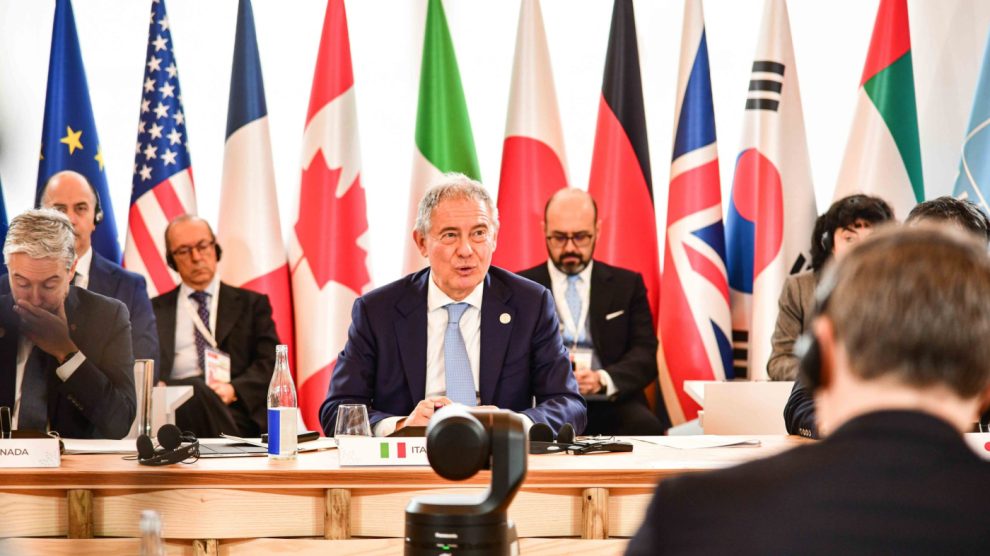Italian G-7 kicks off with industry, AI. On Thursday, Enterprise Minister Adolfo Urso held the first of 2024’s Group of Seven ministerial meetings in Verona with his colleagues from Canada, France, Germany, Japan, the United Kingdom, the United States and the European Union, as well as a handful of “outreach countries” – South Korea, Ukraine, and the United Arab Emirates.
- It centred around a string of key themes, encapsulated in the motto “Growing Together” – indicating the economic avenues for fulfilling shared goals.
- Participants explored issues like emerging technologies, such as artificial intelligence, and their application to industry; security and resilience of supply chains and networks; and sustainable, inclusive digital development at the global level, with a focus on Africa.
The digital meeting happened right after. The Group’s digital representatives met in Trento the following day, hosted by Undersecretary for Technological innovation Alessio Butti along with Minister Urso – who remarked on the “[shift] from competition between our countries to full cooperation, like in ensuring the supply of microchips.” Participants indicated digital governance and the development of human-centred, secure and efficient digital public systems and services, geared towards simplifying the lives of citizens and businesses, as priorities for G-7 countries.
- AI was again at centre stage, with officials discussing regulation. They also delved into access to digital public services, referring to the notion of Digital Public Infrastructure (introduced by the Indian G-20 presidency in 2023) as “an infrastructure solution that could foster sustainable growth and promote more inclusive and equitable access to digital services.”
- The Italian side expressed its commitment to integrating the results of the Hiroshima Process on AI – inherited by Japan’s 2023 G-7 presidency – to “develop, together with stakeholders, appropriate mechanisms for monitoring the voluntary adoption of the International Code of Conduct for Organizations Developing Advanced AI Systems.”
Leveraging AI… G-7 business leaders, who met in private with the industry ministers on Thursday, presented them with a statement remarking that properly-harnessed AI “has the potential to generate prosperity, increase social inclusion, improve health care, support multiple ongoing transitions and expand the reach of digital technologies to new applications and sectors.” That requires closer collaboration between the public and private sectors as well as risk-minimising efforts, they noted.
- Minister Urso later noted that the discussion focussed on the potential positive impact of AI, “with specific reference to increasing productivity, efficiency, innovation and scientific discovery” and a closer focus on “the drivers and challenges of AI adoption by micro, small and medium-sized enterprises.”
… and much more. Participants also talked about quantum technologies, addressing “their potential in the acquisition, transmission and processing of information, as well as in fostering discoveries in chemistry, materials and physics.” And they discussed G-7 wide cooperation initiatives, with an eye on resilience. “The recent conflicts have shown us that, now more than ever, our continent must achieve strategic independence. To this end, in the framework of the G-7, we will collaborate on semiconductors with the Commission to safeguard our economy and our industries,” noted the Italian Enterprise Minister.
AI, chips with Japan… Minister Urso’s first meeting on the sidelines of the ministerial was with Japan’s Deputy Minister of Internal Affairs and Communication, Junji Hasegawa, following in on the steps of his December trip to Tokyo and deepening bilateral relations, “which are increasingly strong and positive,” as he remarked. PM Meloni, who also travelled to Japan as recently as February, has vowed to follow the path laid out by the Hiroshima Process by pursuing shared regulation to make AI human-centric.
- Rome and Tokyo also want to deepen their collaboration in the microelectronics sector, “which is increasingly strategic in view of the industry challenges of the future,” said Minister Urso.
… and platforms with South Korea. Later, Minister Urso met with Jean Koh, chairman of the Korean Commission on Digital Platforms. The two discussed the state of implementation of the recently signed memorandum of understanding geared towards intensifying cooperation between Italy and South Korea in the fields of space science and technology. “The mutual interest in enhancing our cooperation in the fields of microelectronics and quantum computing, to support innovation and digital transformation of our companies, also emerged,” said Minister Urso.





